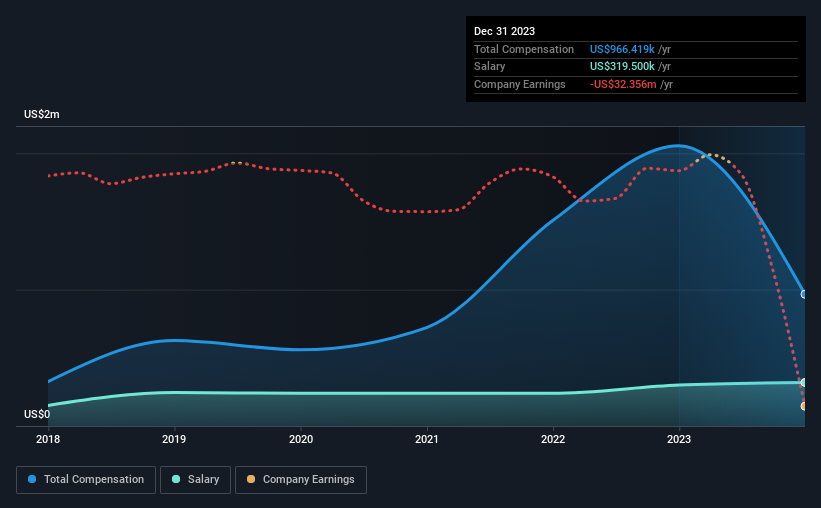Shareholders May Not Be So Generous With U.S. Energy Corp.'s (NASDAQ:USEG) CEO Compensation And Here's Why
Key Insights
U.S. Energy will host its Annual General Meeting on 17th of May
Total pay for CEO Ryan Smith includes US$319.5k salary
The total compensation is 122% higher than the average for the industry
Over the past three years, U.S. Energy's EPS grew by 83% and over the past three years, the total loss to shareholders 69%
Shareholders of U.S. Energy Corp. (NASDAQ:USEG) will have been dismayed by the negative share price return over the last three years. What is concerning is that despite positive EPS growth, the share price has not tracked the trend in fundamentals. These are some of the concerns that shareholders may want to bring up at the next AGM held on 17th of May. They could also influence management through voting on resolutions such as executive remuneration. Here's our take on why we think shareholders may want to be cautious of approving a raise for the CEO at the moment.
See our latest analysis for U.S. Energy
Comparing U.S. Energy Corp.'s CEO Compensation With The Industry
At the time of writing, our data shows that U.S. Energy Corp. has a market capitalization of US$32m, and reported total annual CEO compensation of US$966k for the year to December 2023. That's a notable decrease of 53% on last year. While we always look at total compensation first, our analysis shows that the salary component is less, at US$320k.
On comparing similar-sized companies in the American Oil and Gas industry with market capitalizations below US$200m, we found that the median total CEO compensation was US$435k. Hence, we can conclude that Ryan Smith is remunerated higher than the industry median. What's more, Ryan Smith holds US$1.0m worth of shares in the company in their own name, indicating that they have a lot of skin in the game.
Component | 2023 | 2022 | Proportion (2023) |
Salary | US$320k | US$300k | 33% |
Other | US$647k | US$1.8m | 67% |
Total Compensation | US$966k | US$2.1m | 100% |
Talking in terms of the industry, salary represented approximately 14% of total compensation out of all the companies we analyzed, while other remuneration made up 86% of the pie. U.S. Energy pays out 33% of remuneration in the form of a salary, significantly higher than the industry average. If total compensation is slanted towards non-salary benefits, it indicates that CEO pay is linked to company performance.
A Look at U.S. Energy Corp.'s Growth Numbers
U.S. Energy Corp. has seen its earnings per share (EPS) increase by 83% a year over the past three years. In the last year, its revenue is down 27%.
Shareholders would be glad to know that the company has improved itself over the last few years. It's always a tough situation when revenues are not growing, but ultimately profits are more important. Historical performance can sometimes be a good indicator on what's coming up next but if you want to peer into the company's future you might be interested in this free visualization of analyst forecasts.
Has U.S. Energy Corp. Been A Good Investment?
The return of -69% over three years would not have pleased U.S. Energy Corp. shareholders. Therefore, it might be upsetting for shareholders if the CEO were paid generously.
To Conclude...
Despite the growth in its earnings, the share price decline in the past three years is certainly concerning. The stock's movement is disjointed with the company's earnings growth, which ideally should move in the same direction. Shareholders would be keen to know what's holding the stock back when earnings have grown. The upcoming AGM will be a chance for shareholders to question the board on key matters, such as CEO remuneration or any other issues they might have and revisit their investment thesis with regards to the company.
CEO compensation is an important area to keep your eyes on, but we've also need to pay attention to other attributes of the company. That's why we did our research, and identified 4 warning signs for U.S. Energy (of which 1 is a bit unpleasant!) that you should know about in order to have a holistic understanding of the stock.
Important note: U.S. Energy is an exciting stock, but we understand investors may be looking for an unencumbered balance sheet and blockbuster returns. You might find something better in this list of interesting companies with high ROE and low debt.
Have feedback on this article? Concerned about the content? Get in touch with us directly. Alternatively, email editorial-team (at) simplywallst.com.
This article by Simply Wall St is general in nature. We provide commentary based on historical data and analyst forecasts only using an unbiased methodology and our articles are not intended to be financial advice. It does not constitute a recommendation to buy or sell any stock, and does not take account of your objectives, or your financial situation. We aim to bring you long-term focused analysis driven by fundamental data. Note that our analysis may not factor in the latest price-sensitive company announcements or qualitative material. Simply Wall St has no position in any stocks mentioned.

